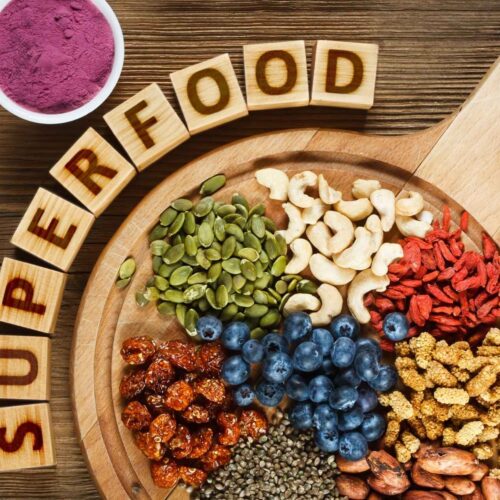Introduction
The term “superfood” is a marketing buzzword that promises extraordinary health benefits, including effortless weight loss and fat burning. While some foods boast an impressive nutritional profile, the idea that eating specific foods will magically melt away fat is a myth. However, incorporating nutrient-rich foods into your diet can certainly support your overall health and weight management goals.
What Makes a “Superfood”?
There’s no official scientific definition for a “superfood.” The term is often applied to foods packed with nutrients like:
- Vitamins & Minerals: Essential for various bodily functions that indirectly support a healthy metabolism.
- Antioxidants: Help protect cells from damage and may have a role in reducing inflammation linked to certain health conditions.
- Fiber: Promotes satiety, aids digestion, and helps regulate blood sugar, important for weight management.
- Healthy Fats: Contribute to satiety, brain health, and the absorption of certain vitamins.
Debunking the “Fat-Burning” Myth
- No Food Directly Burns Fat: Fat burning is a complex physiological process involving metabolism and energy expenditure. While some foods may slightly boost metabolism or support satiety, they won’t single-handedly lead to significant fat loss.
- Calorie Deficit Matters: Weight loss fundamentally comes down to creating a calorie deficit – burning more calories than you consume. No food can override this principle.
- Beware of Hype: Foods marketed as “fat-burning” often prey on the desire for a quick fix without addressing the need for overall healthy habits.
Foods That Can Support Your Weight Loss Journey
While there’s no single “superfood” for fat burning, here are categories of foods to prioritize:
- High-Protein Foods: Lean meats, fish, eggs, tofu, beans, and Greek yogurt help preserve muscle mass (which burns calories), boost satiety, and have a higher thermic effect (it takes more energy to digest).
- Fiber-Rich Fruits & Vegetables: Berries, apples, broccoli, and leafy greens fill you up for fewer calories, promote gut health, and aid blood sugar stability.
- Whole Grains: Oats, brown rice, and quinoa offer sustained energy and fiber compared to refined grains.
- Healthy Fats: Avocados, nuts, seeds, and olive oil provide essential fats and increase satiety, curbing mindless snacking.
- Green Tea: Contains catechins that may have a very modest effect on increasing metabolism and fat oxidation.
Beyond The “Superfoods”
Focusing on specific foods can distract from the bigger picture of a healthy, balanced diet:
- Portion Control: Even healthy foods can contribute to weight gain if eaten in excess. Practice mindful portion sizes.
- Variety is Key: No single food provides everything you need. Aim for a colorful range of fruits, vegetables, and other whole foods.
- Hydration: Water is essential for fat metabolism and overall health. Aim to drink enough throughout the day.
- Sustainable Habits: Extreme diets or restrictions lead to rebound effects. Focus on enjoyable, sustainable changes.
Additional Factors That Influence Fat Burning
- Strength Training: Building muscle mass increases resting metabolic rate, burning more calories at rest.
- Cardiovascular Exercise: Regular cardio burns calories and improves overall fitness.
- Sleep: Lack of sleep disrupts hunger hormones and increases cravings for unhealthy foods.
- Stress Management: Chronic stress boosts cortisol levels, which promotes fat storage, especially around the abdomen.
Key Points (A Recap)
- No food can single-handedly “burn fat.”
- “Superfood” is a marketing term, not a scientific one.
- Focus on protein, fiber-rich produce, whole grains, and healthy fats to support weight loss goals.
- Sustainable, healthy habits are more important than chasing “superfood” trends.
- The Potential for Specific Nutrients: While individual foods don’t directly cause fat loss, certain nutrients might offer small advantages:
- Capsaicin (in chili peppers): May have a very slight effect in temporarily boosting metabolism.
- Omega-3 Fatty Acids (in oily fish): May support fat metabolism and reduce systemic inflammation.
- The Power of Food Synergy: Focusing on whole-food combinations may be more beneficial than fixating on isolated nutrients. For example, pairing a protein source with a colorful array of vegetables provides a broader spectrum of vitamins, minerals, and antioxidants.
- Individual Response: Even with foods offering potential benefits, there will be individual variations in how people respond. Genetics and other factors play a role.
- Beware of Processed “Superfood” Products: Cookies, bars, or shakes infused with trendy “superfood” ingredients are often high in added sugar and calories. Focus on whole, unprocessed forms.
- Superfoods as Part of an Overall Lifestyle: Including various nutrient-dense foods is a wise strategy. However, remember that exercise, sleep, stress management, and a balanced diet are just as essential for sustainable weight loss and overall health.
Conclusion
While the idea of “superfoods” that melt away fat is appealing, it’s an oversimplification. There’s no magic bullet for weight loss. However, filling your diet with nutritious foods contributes to overall metabolic health and provides energy and satiety, supporting your weight loss goals. Here’s the bottom line:
- Ditch the Shortcuts: Focus on a balanced diet rich in whole foods, paired with regular exercise and healthy lifestyle habits.
- Enjoy the Variety: Appreciate the deliciousness and health benefits of a vast range of nutritious foods.
- Beware of Misleading Marketing: Be skeptical of products touting unrealistic “fat-burning” claims.
- Celebrate Sustainable Changes: Lasting weight loss comes from building a healthy relationship with food and your body.

